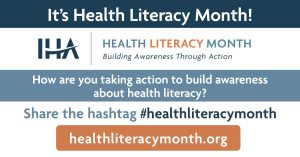Oct
06

Posted by fsteele on October 6th, 2023
Posted in: Uncategorized

October is Health Literacy Month
October is here and so are some of the best aspects of the year–coming together for apple picking, dressing up in silly (or scary costumes), and settling in as the weather grows cold. It is also time for Health Literacy Month. Health Literacy Month was started over 20 years ago to increase health literacy rates. The goal of increasing Health Literacy is not just for patients to understand health information but to be able to make well-informed decisions about their health. To do this, the relationships between health professions, including doctors, government and social service agencies and their patients requires attention to create a mutually beneficial one.
Individuals with low health literacy tend to have difficulty understanding the health care system and follow-up care issues. Roughly 80 million adults in the United States have little to no health literacy; this population includes older adults, those with limited education, lower income, difficulty managing chronic diseases, and those who are non-native English speakers. To combat these issues, special programs, pamphlets, and more are created by social service and government agencies, and even librarians, to bring about more equitable health care.
There are four components of health literacy that health professionals and information providers can focus on when creating health literacy focused content: the ability to access/obtain relevant information, understanding that information, how to process and appraise relevant information, and how to apply the information to everyday life. These four dimensions are focused within health care, disease prevention, and health promotion.
Clear communication and understanding can lead to better health outcomes for everyone. It starts with how we communicate that information, which we can do by ensuring our communities have access to health information. We can do this by creating materials in plain language and graphics, providing training to health professionals to improve and inform them of best health literacy skills, creating information hubs for information professionals, and taking time to review materials with community members to ensure they understand instructions.
There are many resources available from the National Network Library of Medicine regarding health literacy and how we as librarians can make it an aspect of our practice. While not all of us work in a public-facing role, we can inform others about opportunities as well. There are several trainings we can participate in through NNLM including the following:
This post was written by Ashley Purvis, Scholarly Engagement Librarian, Health Sciences Library, West Virginia University